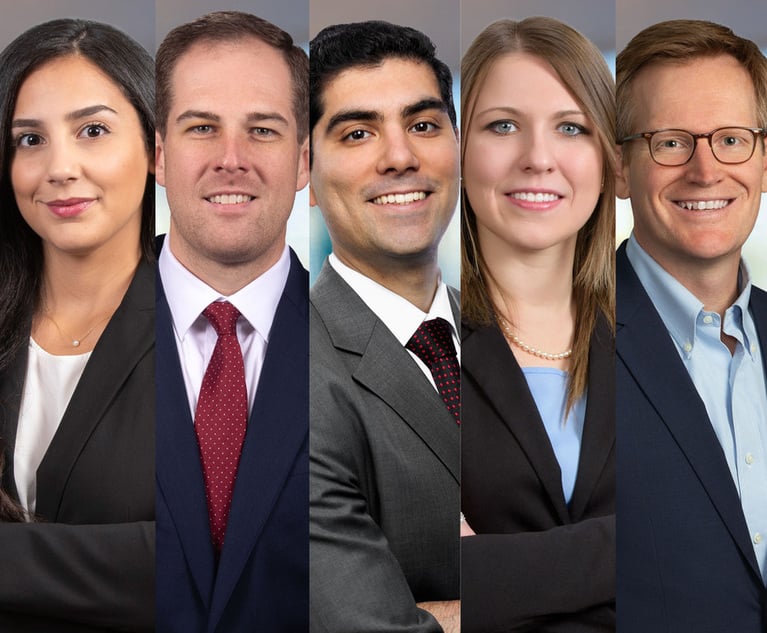 Connecticut Superior Court judges Andrew Roraback, left, and Thomas Moukawsher, right. Courtesy photos
Connecticut Superior Court judges Andrew Roraback, left, and Thomas Moukawsher, right. Courtesy photos Connecticut Judges, Working From Home, Miss the Same Things You Do
Both former politicians, and both nominated to the bench in 2013 by Gov. Dannel Malloy, Roraback and Moukawsher said their top priority during the COVID-19 pandemic has been to resolve as many cases as they can as the state continues its efforts to get back to regular speed.
September 08, 2020 at 04:21 PM
7 minute read
NewsConnecticut lawyers have faced an array of challenges brought on by the COVID-19 pandemic, including work interruptions, slowdowns and shutdowns, but how are judges handling "the new normal" in the Constitution State?
In recent interviews with the Connecticut Law Tribune, two judges with parallel careers — Hartford Superior Court Judge Thomas Moukawsher and Waterbury Superior Court Judge Andrew Roraback — discussed how the pandemic has affected their jobs and how they see the judicial branch's functions evolving.
Both former politicians, and both nominated to the bench in 2013 by Gov. Dannel Malloy, the judges said their top priority during the COVID-19 pandemic has been to resolve as many cases as they can as the state continues its efforts to get back to regular speed.
Roraback, of Goshen, served for nearly 18 years as a Republican state senator and representative while working at the family firm Roraback & Roraback. Moukawsher, of Groton, has been a state representative, a law clerk to Gov. William O'Neill and outside counsel to Congressman John Larson, among other official state Democratic positions.
With seven years now under his robe as a judge, Roraback said his first term has made him "older" and perhaps a little wiser. "For 18 years I was in the kitchen making the stew," he said, "and I said 'Boy this stew looks great.' And now, for the past seven years, I've had to eat the stew. Some parts of it near-perfect, while others could use some work."
Initially seated in Danbury, Roraback's chambers are now at Waterbury Superior Court. Since the arrival of COVID-19, he has worked out of his home, overseeing online bench trials and motions for case settlements. While there have been limitations, Roraback said he has been impressed with how much work the state's judicial branch has been able to complete, even without conducting jury trials.
The courts "have been able to accomplish a lot, thanks to the good will of lawyers to settle cases, which is what we always prefer," Roraback said. "The pandemic doesn't interfere with the settlement of cases when everyone is working toward that end — and thank God for technology, which has allowed us to move forward," he said.
Moukawsher said court business has been steadily increasing, and without the normal ringing phones and knocks on the doors to his chambers, he has had more time to be contemplative in his work at home. "When you have your lunch break and can take a walk before getting back in front of your computer, the mind works better. It's a different world for everybody, but for me it's positive," he said. "From the standpoint of productivity, things have ramped up. I think it's that much easier for lawyers to come to court. They don't have to drive — they're there on the screen."
While Moukawsher appreciates being able to work remotely, he acknowledged a soft spot in his heart for the regular workplace. "I certainly miss the contact and interchange with colleagues," he said. "A lot of us have been connecting with each other virtually, using the Microsoft Teams platform. We have lunch conversations and things of that nature."
Moukawsher said he recently concluded evidence in a lengthy trial that was held online and that it worked "very well," with participants having become conversant with the on-screen format and related protocols. Leading up to that point, though, there were "lots of awkward moments," including instances in which people did not know when it was their turn to speak or what to say, experienced technical glitches and made errors in "mic discipline" — slip-ups leaving their microphones "hot" at the wrong moment. "If you backed up a year and told people it was going to be like this, they would have laughed at you, but this is an ordinary way of life now," Moukawsher said.
One of the most rewarding aspects of home-based work for the judge has been the elimination of his commute, which runs about an hour and 15 minutes each morning from Groton to Hartford, and then back in in the evening. Eliminating two and a half hours of driving time each day has given Moukawsher back valuable time to think through cases and, importantly, to write. "I've been able to use that time for prepping, writing and thinking," he said.
Otherwise, the judge said, he follows a schedule that is markedly similar to the one he follows in court. "In my home office I can get in here nice and early and gear up for whatever is in front of me. The phone rings in the morning, and it's the clerk."
Roraback agreed that working from home affords a degree of comfort that has translated into increased efficiency. "Every morning I get up, put on a tie and I sit in our guest room and start the Microsoft Teams meetings," he said, referring to the judiciary's preferred video communications platform. "I connect with all the lawyers who would have been sitting in my chambers."
Both Roraback and Moukawsher said that while the success of bench trials has been a pleasant surprise, they don't envision jury trials being able to sustain the same level of smoothness, simply due to the involvement of so many people. "I have strong feelings that jury trials should be live," Moukawsher said. "I know that the branch is working very hard to put the physical infrastructure in place, but we're also opening virtual courtrooms, and they're multiplying. Every month there has been a new development. We just expanded the short calendar, and things are changing minute-by-minute."
Roraback added that remote jury trials would be much more tedious and difficult to conduct. "Jury trials are complicated, and making them virtual would be fraught with complicated questions," he said.
A noticeable difference with virtual bench trials, Moukawsher noted, is visual perspective as it relates to witness credibility. "In court you have a witness sitting next to you, and you're looking at the side of them," he noted. "On the online platform, you're looking right at them, and you can pin them on your screen. You can make them the biggest thing on your screen, so you're looking right at the face of the witness. As long as you have a good screen, it works pretty well. You can see every little twitch on their face, and I've found that useful."
Having experienced all of the advantages of virtual meetings and hearings, Moukawsher said participants seem to agree the format should continue to serve a purpose in court. "Sometimes it takes a crisis for changes to take hold," he said. "This is beginning to become routine for people, and I can imagine lawyers saying 'Do you really want me to come in for this five-minute meeting? Why don't we just do it online?' Will it ever go back to the way it used to be? I hope it doesn't."
One thing Roraback said won't change is the fact that at the center of every case is someone who is relying on the system to right wrongs and allow them to move forward with their lives. "We can't lose sight of the fact that behind every case in civil court, often there are people who have been severely injured, and they need money to pay their hospital bills. We can't turn a blind eye to that reality. That's why we're doing our level best to see if we can resolve things. When people suffer catastrophic injuries, it is totally life-altering."
And while the COVID-19 pandemic has made for trying times, Roraback said he hopes it will be followed by a better chapter. "Everyone at the Judicial Branch is working their hearts out to keep it together," he said. "It's work — it's important and consequential work — and at the end of the day, it's satisfying work."
NOT FOR REPRINT
© 2025 ALM Global, LLC, All Rights Reserved. Request academic re-use from www.copyright.com. All other uses, submit a request to [email protected]. For more information visit Asset & Logo Licensing.
You Might Like
View All
'They Are Never Going to Learn': Geico Not Protected by Litigation Privilege
3 minute read
K&L Gates Files String of Suits Against Electronics Manufacturer's Competitors, Brightness Misrepresentations
3 minute read
Eleven Attorneys General Say No to 'Unconstitutional' Hijacking of State, Local Law Enforcement
3 minute readTrending Stories
- 1We the People?
- 2New York-Based Skadden Team Joins White & Case Group in Mexico City for Citigroup Demerger
- 3No Two Wildfires Alike: Lawyers Take Different Legal Strategies in California
- 4Poop-Themed Dog Toy OK as Parody, but Still Tarnished Jack Daniel’s Brand, Court Says
- 5Meet the New President of NY's Association of Trial Court Jurists
Who Got The Work
J. Brugh Lower of Gibbons has entered an appearance for industrial equipment supplier Devco Corporation in a pending trademark infringement lawsuit. The suit, accusing the defendant of selling knock-off Graco products, was filed Dec. 18 in New Jersey District Court by Rivkin Radler on behalf of Graco Inc. and Graco Minnesota. The case, assigned to U.S. District Judge Zahid N. Quraishi, is 3:24-cv-11294, Graco Inc. et al v. Devco Corporation.
Who Got The Work
Rebecca Maller-Stein and Kent A. Yalowitz of Arnold & Porter Kaye Scholer have entered their appearances for Hanaco Venture Capital and its executives, Lior Prosor and David Frankel, in a pending securities lawsuit. The action, filed on Dec. 24 in New York Southern District Court by Zell, Aron & Co. on behalf of Goldeneye Advisors, accuses the defendants of negligently and fraudulently managing the plaintiff's $1 million investment. The case, assigned to U.S. District Judge Vernon S. Broderick, is 1:24-cv-09918, Goldeneye Advisors, LLC v. Hanaco Venture Capital, Ltd. et al.
Who Got The Work
Attorneys from A&O Shearman has stepped in as defense counsel for Toronto-Dominion Bank and other defendants in a pending securities class action. The suit, filed Dec. 11 in New York Southern District Court by Bleichmar Fonti & Auld, accuses the defendants of concealing the bank's 'pervasive' deficiencies in regards to its compliance with the Bank Secrecy Act and the quality of its anti-money laundering controls. The case, assigned to U.S. District Judge Arun Subramanian, is 1:24-cv-09445, Gonzalez v. The Toronto-Dominion Bank et al.
Who Got The Work
Crown Castle International, a Pennsylvania company providing shared communications infrastructure, has turned to Luke D. Wolf of Gordon Rees Scully Mansukhani to fend off a pending breach-of-contract lawsuit. The court action, filed Nov. 25 in Michigan Eastern District Court by Hooper Hathaway PC on behalf of The Town Residences LLC, accuses Crown Castle of failing to transfer approximately $30,000 in utility payments from T-Mobile in breach of a roof-top lease and assignment agreement. The case, assigned to U.S. District Judge Susan K. Declercq, is 2:24-cv-13131, The Town Residences LLC v. T-Mobile US, Inc. et al.
Who Got The Work
Wilfred P. Coronato and Daniel M. Schwartz of McCarter & English have stepped in as defense counsel to Electrolux Home Products Inc. in a pending product liability lawsuit. The court action, filed Nov. 26 in New York Eastern District Court by Poulos Lopiccolo PC and Nagel Rice LLP on behalf of David Stern, alleges that the defendant's refrigerators’ drawers and shelving repeatedly break and fall apart within months after purchase. The case, assigned to U.S. District Judge Joan M. Azrack, is 2:24-cv-08204, Stern v. Electrolux Home Products, Inc.
Featured Firms
Law Offices of Gary Martin Hays & Associates, P.C.
(470) 294-1674
Law Offices of Mark E. Salomone
(857) 444-6468
Smith & Hassler
(713) 739-1250











